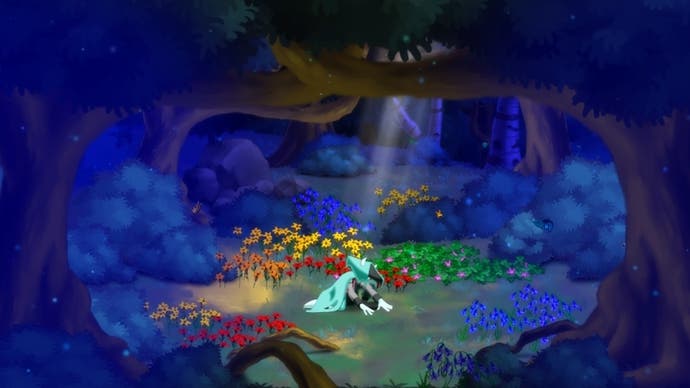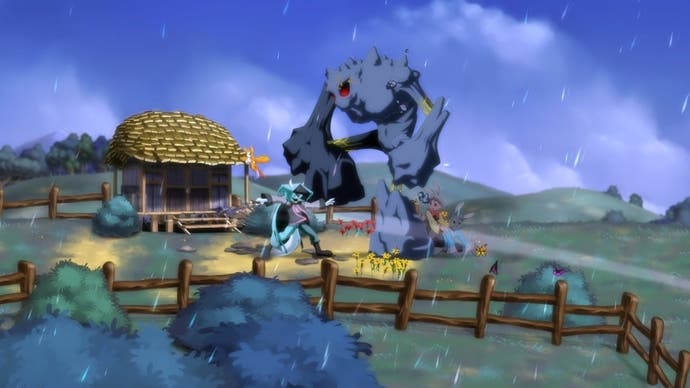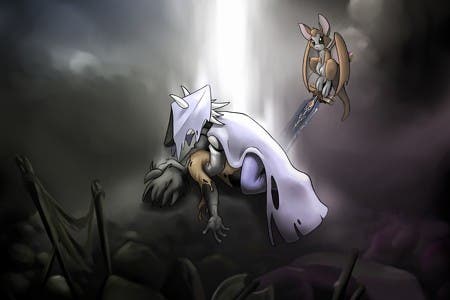Dust: An Elysian Tail Review
Ultraviolence for all the family.
Furries. In Dust: An Elysian Tail, you can't escape them. Nearly every location has one or two of the goggle-eyed creatures lolloping about, and the towns are crammed to the rafters with them. It's like Saturday morning telly. Dust is a gorgeous and fun 2D slash-'em-up with an RPG-lite layer - so why, you sometimes catch yourself wondering, do the characters look like Bambi's B-list?
Who knows. It's not a case of wanting buckets of gore, but it feels like there's a disconnect between the game's action and its extraordinarily family-friendly visual style. Perhaps it will find a new audience outside of the genre's traditional hardcore crowd, but Dust's look often slips into limply saccharine for me.
Beneath this surface beats the heart of a soldier. The most direct forebear to Dust's combat system is 2008's excellent The Dishwasher: Dead Samurai, an intense 2D slasher with a winning weapon-switch system. Dust's combat has a less frenetic pace, but the principles of two-button combos and constant movement lend it an instantly familiar rhythm, embellished with an unusual take on projectile attacks. Time to talk about that flying cat.

You'll eventually learn to live with Fidgit, despite the squeaky voice, because in concert with our hero Dust, the pair can pull off some awesome techniques. Fidgit begins with an attack that shoots three projectiles in a descending arc, which do very little damage, but these can be turned into a screen-filling storm of bullets whipping back and forth if Dust is spinning his sword. This relatively simple teamwork - one button press followed by another button held - is not exactly the foundation of Dust's combat system, but it's how you hit combos in the hundreds on autopilot.
Dust's combat system is superficially impressive but ultimately a bit lacking. It's OK. There are plenty of combinations to learn, many of which look good and hit home with oomph, but the system lacks the fluidity of its animation. There's no room for expression within its techniques, with patterns locked, and the end of certain movements always accompanied by a pause in Dust's motion. This in and of itself is not necessarily a problem, but the enemies are incapable of punishing such moments in a manner that might make you think twice about using them, and so you just end up frustrated at the edge of a fight and waiting to dash back in after that cooldown. We're talking a pause of a second at most, but in a game such as this, it sometimes feels much longer. Don't even get me started on the combo system, which with the inclusion of Fidgit's hundred-hitting projectile attacks, is no such thing.
The bigger problem is that it's all too easy. On Normal, this is no challenge whatsoever. The timing window for parries is far too generous, enemies seem to be scared of attacking, and most groups are scattered without a semblance of danger. You level up Dust in great leaps through ability gems, and can also acquire various kit that buffs him further, so by the time you're halfway through the game, he's killing the biggest monsters with one simple parry and a couple of hits.

The common enemies become nothing more than an irritant, and one of the game's biggest strengths - you can re-explore earlier areas with new powers to bag hidden loot - is rather undermined by the fact that the enemies don't scale to Dust's abilities. So you'll be trotting back through an early location and just pressing X as enemies walk up. One hit, bang. That's not fun. It's tedious.
With that said, the first play-through is an enjoyable adventure, and occasionally a dark one. A world map lets you select areas to visit, each of which is structured in its own manner - from great horizontal stretches to plummeting underground caverns. As well as the quest objective you're heading towards, side routes and hidden entrances disguise fat treasure chests full of loot and, occasionally, cages containing other game characters like Meat Boy or Mr Spelunky. And though the character art doesn't do it for me, the environments certainly do - they're equal parts gorgeous and ominous, with neat little details sewn throughout their fabric.
The quests are nicely implemented, too, with the ability to take on as many as you want and complete them as and when is convenient. Dust's main narrative is an amnesiac's tale, as you try to find out who this character is and what his past holds, and in places it's a surprisingly grim yarn. But there's a sense of humour at work in the side-stories, one that winningly undercuts things when it all gets a bit too heavy, with a child's eye for mischief-making and silly jokes.
It's this kind of warmth that makes Dust an enjoyable game to play through. But perhaps a focus on what it does well would have made it more than enjoyable. There's all sorts of stuff here that's unnecessary, or at the least not fleshed out enough. The crafting system is shallow and feels largely redundant, not only because you don't really need the stuff it provides to barrel through the game, but also because you're never short of raw ingredients. Find a new crafting ingredient, sell it to one shopkeeper, and then all the world's shopkeepers will begin acquiring stock of it over time. Nice idea, but it rather crimps the value of loot thereafter.
The sad thing is that Dust is clearly a labour of love; you can tell from the little things, like how every house in the towns is different, or the way completed quests are neatly filed away for no real reason. Dust does many things well, but it doesn't do anything brilliantly. The combat's decent, the structure invites the revisiting of old areas, and the narrative stays interesting. Taken together, these things are enough to keep you plugging away till the end.
But good enough doesn't quite cut it when there are better examples of almost everything Dust does on Xbox Live Arcade. The quality of download titles in general, even, is better than it has ever been. And in that context, you can't help but feel Dust will get blown away.









